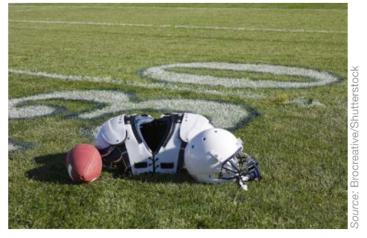Playing professional football, almost by definition, is not one of the safest jobs in the world, especially
Question:
Playing professional football, almost by definition, is not one of the "safest" jobs in the world, especially at the level of the U.S. National Football League (NFL) where players get injured almost every week of play. Sprained ankles, torn ligaments, concussions, and broken bones are pretty much par for the course. More than 200 concussions are reported during a typical football season.
Over the past few decades, however, retired NFL players, in particular, have been raising concerns about how repetitive head injuries/concussions sustained while playing in the NFL have deleteriously impacted them later in life. Evidence began to mount that many retired NFL players faced considerable neurological problems later in life, including issues such as permanent brain damage, dementia, and rates of Alzheimer's disease and clinical depression that are much higher than average. Some NFL players have arguably even committed suicide due to degenerative brain disease.
During 2011 and 2012, various retired NFL players brought lawsuits against the NFL with respect to this issue. The players argued that the professional football league knew or should have known the risks to NFL players due to concussions/traumatic repetitive brain injuries suffered during the NFL games and that it did not do enough to prevent these injuries. In August 2013, the NFL agreed to settle these lawsuits by paying nearly \(\$ 1\) billion to retired NFL players who have suffered injuries in this regard. Retired players suffering from Parkinson's or Alzheimer's diseases will receive as much as \(\$ 3\) million apiece, and those suffering from Lou Gehrig's disease/amyotrophic lateral sclerosis (ALS) will receive up to \(\$ 5\) million. All retired NFL players will be eligible for NFL-paid neurological medical monitoring and baseline testing, with \(\$ 75\) million allocated to pay for this. Moreover, the NFL will also give \(\$ 10\) million to fund brain injury research and various education/sfety programs.

Is this monetary settlement a fair one? Certainly the \(\$ 1\) billion number is a very significant one, with retired players potentially receiving significant individual compensation (approximately \(\$ 190,000\) per retired player). Also, the funds for future research could be very meaningful. Moreover, the settlement avoided potentially years of costly litigation, with likely little remedy of the situation during the ongoing litigation. That said, many felt that the NFL "got off cheap" with respect to the settlement deal. In one year, the NFL's total revenues amount to about \(\$ 14\) billion, and observers expect that to increase to about \(\$ 25\) billion by the year 2025. Clearly, the league's future revenue stream should likely be able to support these payments. Moreover, there are concerns that the agreement does not really get at the more systemic issue of making the game safer. Critics feel changes will have to start at the youth, high school, and college levels-levels of football play that involve many more individuals than the 4,800 former NFL players involved in the given lawsuits. Some also feel that the \(\$ 1\) billion payment will lead folks to overlook ongoing safety concerns that continue to exist. To address injuries among youth, the NFL is spending \(\$ 1\) million to encourage flag football at schools-a type of football that avoids collisions.In 2017, the NFL was dealt another blow. Researchers discovered that 177 out of 202 brains from former football players who had played football sometime during their lives-including pre-high school, high school, college, and/or professional-showed evidence of brain degenerative disease. These brains were donated rather than selected at random, and the results therefore could be skewed. However, the findings suggest that concussion trauma among NFL players is much more prevalent than originally thought. This is starting to have repercussions for the football industry. The risks of suffering from permanent brain damage have already convinced some NFL players to retire early. One poll found that parents are 44 percent less likely to allow their children to play football. These additional findings may lead to more lawsuits against the NFL in the future........
Question
1. To what extent should there be something of a caveat emptor/buyer beware when someone chooses to professionally play football in the NFL?
2. Can the NFL ever really make professional football totally safe?
3. Is playing in the NFL different from being a NASCAR driver, a police officer, or an astronaut?
Step by Step Answer:

Management Principles And Applications
ISBN: 9781942041719
4th Edition
Authors: Leonard Bierman, O.C Ferrell , Linda Ferrell





